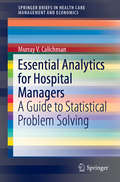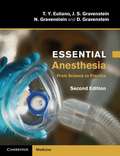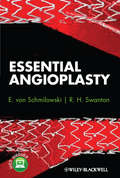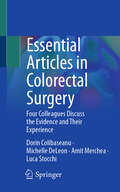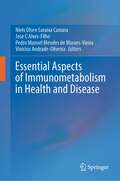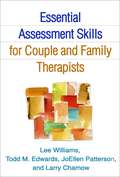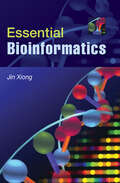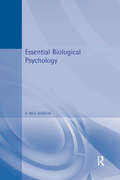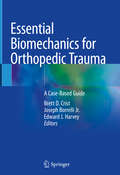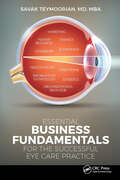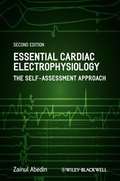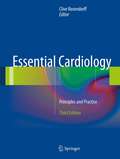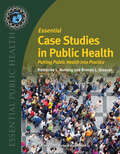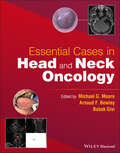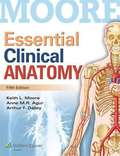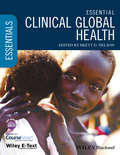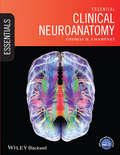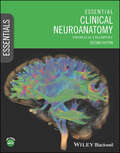- Table View
- List View
Essential Analytics for Hospital Managers: A Guide to Statistical Problem Solving (SpringerBriefs in Health Care Management and Economics)
by Murray V. CalichmanThis book provides practical applications of statistical and mathematical concepts to resolve common issues in hospital management. Each chapter discusses a key component of hospital operations, such as maximizing hospital profitability through pricing optimization, forecasting facility requirements from historical data, and determining optimal patient schedules to fully utilize hospital resources in order to eliminate over-crowding in the emergency department. Structured by the degree of mathematical complexity, this professional book utilizes problem-solving methodologies ranging from basic statistical concepts (means and standard deviations) to more advanced statistics (Poisson distributions and queuing theory). Concluding with computer applications and simulations, the practical examples will help hospital managers to optimally and innovatively make use of linear programming. The book’s main goal is to make hospital personnel more aware of the benefits of management science methodologies that are not usually employed in today’s hospitals.
Essential Anesthesia
by J. S. Gravenstein N. Gravenstein D. Gravenstein T. Y. EulianoEssential Anesthesia is a concise, accessible introduction to anesthetic practice. Now in its second edition, it provides a thorough overview of the science and practice of anesthesia. Part I describes the evaluation of the patient, the different approaches to anesthesia, and the post-operative care of the patient in pain. Part II introduces the essentials of physiology and pharmacology and their role in understanding the principles of anesthesia. The final part presents a step-by-step description of 14 clinical cases. These clinical vignettes give a very real introduction to the practicalities of anesthesia and will give the non-anesthetist physician an idea of how to prepare a patient for a surgical procedure. All chapters have been expanded and updated and an entirely new chapter on safety in healthcare has been added. This is the perfect introductory text for medical students, junior doctors and all operating theatre and critical care staff.
Essential Angioplasty
by R. H. Swanton E. Von SchmilowskiA vast choice of techniques and technology confronts today's interventional cardiologists, and those who are new to angioplasty need clear and practical guidance in order to develop good habits, avoid common pitfalls and complications, and become efficient and confident practitioners. This new book supplies a solid grounding in the basics of percutaneous techniques by providing selective, practical knowledge and a full range of useful tools and tips. Throughout, the authors follow the motto "keep it simple" and focus only on the information that will help the reader learn and master the relevant technique. The book is designed for ease of use in the cath lab or other situations where the reader needs to access information quickly.
Essential Aromatherapy: A Pocket Guide to Essential Oils and Aromatherapy
by Valerie Ann Worwood Susan WorwoodHere is a complete guide to aromatherapy, a modern healing technique with ancient origins. Essential Aromatherapy organizes essential oils into alphabetical listings, providing their profiles, applications, and the physical and emotional conditions that warrant their use. Also included are detailed treatments for a variety of ailments and special circumstances.
Essential Articles in Colorectal Surgery: Four Colleagues Discuss the Evidence and Their Experience
by Dorin Colibaseanu Michelle DeLeon Amit Merchea Luca StocchiThis book is an anthology of important articles that have influenced partner surgeons in a colorectal surgical practice. Following the citations of these articles, there is a formal critique by one individual partner, then the remaining partners add their perspective presented in the form of a conversation. The contributions will be constructed as a discussion but will also include references to additional contemporary articles pertaining to the topic at hand. At times, the conversation will result in complete agreement, but there are other times where there could be differences, which could be anticipated given the individual background, age and time in practice of each surgeon. Highlighted throughout are situations where the practice has changed for the better, as well as other situations that remain open for discussion. The breadth of colorectal surgery as a specialty is covered, including anorectal surgery, abdominal surgery, both open and minimally invasive, inclusive of both benign and malignant disease.
Essential Aspects of Immunometabolism in Health and Disease
by Niels Olsen Saraiva Camara Jose C Alves-Filho Pedro Manoel Mendes de Moraes-Vieira Vinicius Andrade-OliveiraImmunometabolism has emerged as an intersectional crossroad between metabolism and immune response. Over the past decade, it has become clear that most - if not all - immune cell functions are not separated from cellular metabolism. Although seminal works have addressed the metabolic fate of immune cells during differentiation and function, the physiological status of a given tissue is also dependent on the cell metabolism. The dialogue between immune cells and their microenvironment can also modulate cellular metabolism, which can trigger the onset and progression of a multitude of inflammation-mediated diseases. Thus, uncovering the specific characteristics of the metabolism in different immune cells types and in different conditions, can shed light into the molecular mechanisms of disease and help develop new drugs and therapeutic strategies to treat immune diseases.The edited volume Essentials aspects of Immunometabolism will give the readers a broad view on how metabolic pathways can influence many types of immune cells during activation, differentiation and function, in health and disease. Of note, the structure of the book was created thinking not only on the experienced immunologist but also on undergraduate and graduate students, physicians, and all members of the scientific community interested in this exciting field of research.
Essential Assessment Skills for Couple and Family Therapists
by Lee Williams Todd EdwardsShowing how to weave assessment into all phases of therapy, this indispensable text and practitioner guide is reader friendly, straightforward, and practical. Specific strategies are provided for evaluating a wide range of clinical issues and concerns in adults, children and adolescents, families, and couples. The authors demonstrate ways to use interviewing and other techniques to understand both individual and relationship functioning, develop sound treatment plans, and monitor progress. Handy mnemonics help beginning family therapists remember what to include in assessments, and numerous case examples illustrate what the assessment principles look like in action with diverse clients.
Essential Bioinformatics
by Jin XiongEssential Bioinformatics is a concise yet comprehensive textbook of bioinformatics, which provides a broad introduction to the entire field. Written specifically for a life science audience, the basics of bioinformatics are explained, followed by discussions of the state-of-the-art computational tools available to solve biological research problems. All key areas of bioinformatics are covered including biological databases, sequence alignment, genes and promoter prediction, molecular phylogenetics, structural bioinformatics, genomics and proteomics. The book emphasizes how computational methods work and compares the strengths and weaknesses of different methods. This balanced yet easily accessible text will be invaluable to students who do not have sophisticated computational backgrounds. Technical details of computational algorithms are explained with a minimum use of mathematical formulae; graphical illustrations are used in their place to aid understanding. The effective synthesis of existing literature as well as in-depth and up-to-date coverage of all key topics in bioinformatics make this an ideal textbook for all bioinformatics courses taken by life science students and for researchers wishing to develop their knowledge of bioinformatics to facilitate their own research.
Essential Biological Psychology (Essential Psychology)
by G Neil MartinThe Essential Psychology Series bridges the gap between simple introductory texts aimed at pre-university students and higher level textbooks for upper level undergraduates. Each volume in the series is designed to provide concise yet up-to-date descriptions of the major areas of psychology for first year undergraduates or students taking psychology as a supplement to other courses of study. The authors, who are acknowledged experts in their field, explain the basics carefully and engagingly without the over-simplification often found in introductory textbooks, at the same time providing the reader with insights into current thinking.Essential Biological Psychology is an accessible, well-illustrated and well-written account of the study of the role of the body in behaviour and the effect of behaviour on the working of the body. Covering all the major topics within biopsychology, and evaluating the most up-to-date findings, particularly within neuroscience and neuroimaging research, this textbook is essential reading for first and second level undergraduates taking courses in biological or physiological psychology as well as anyone studying courses in neuropsychology or behavioural neuroscience.
Essential Biomaterials Science
by David WilliamsThis groundbreaking single-authored textbook equips students with everything they need to know to truly understand the hugely topical field of biomaterials science, including essential background on the clinical necessity of biomaterials, relevant concepts in biology and materials science, comprehensive and up-to-date coverage of all existing clinical and experimental biomaterials, and the fundamental principles of biocompatibility. It features extensive case studies interweaved with theory, from a wide range of clinical disciplines, equipping students with a practical understanding of the phenomena and mechanisms of biomaterials performance; a whole chapter dedicated to the biomaterials industry itself, including guidance on regulations, standards and guidelines, litigation, and ethical issues to prepare students for industry; informative glossaries of key terms, engaging end-of-chapter exercises and up-to-date lists of recommended reading. Drawing on the author's forty years' experience in biomaterials, this is an indispensable resource for students studying these lifesaving technological advances.
Essential Biomechanics for Orthopedic Trauma: A Case-Based Guide
by Joseph Borrelli Brett D. Crist Edward J. HarveyBiomechanics is often overlooked when dealing with orthopedic injuries, whether regarding prevention or treatment, and practicing surgeons and surgeons-in-training may feel overwhelmed when referring to a book with a more complicated basic science approach. In order to make the subject clinically relevant to orthopedic trauma surgery, this unique text presents numerous clinical case examples to demonstrate clearly and effectively the principles biomechanics of injury, fixation and fracture healing. Divided into five sections, the opening chapters cover the essentials of stress and strain relevant to bone and joints and how this relates to fractures and their healing, complete with illustrative case material. This case-based approach is carried throughout the book, with part two discussing biomechanical principles of external fixation for diaphyseal and periarticular fractures, limb lengthening and deformity correction. Tension band wiring for both olecranon and patella fractures are covered in part three, and both locking and nonlocking plates are illustrated in part four. The final section describes biomechanical principles of intramedullary nails for a variety of fractures and nonunions, as well as arthrodesis and lengthening. Generous radiological images and intraoperative photos provide a helpful visual enhancement for the clinical material. Making the sometimes esoteric topic of biomechanics more clinically relevant to the practicing clinician, Essential Biomechanics for Orthopedic Trauma will be an excellent resource not only for orthopedic surgeons, sports medicine specialists and trauma surgeons, but also medical and biomedical engineering students and residents.
Essential Burn Care for Non-Burn Specialists
by Jong O. LeeDespite a decreasing number of burns and improvement in mortality of burn patients in the United States, burn injuries are still frequent. Non-burn specialists such as emergency medicine physicians and primary care physicians will inevitably treat burn patients. In many instances, the first clinicians to see burn patients are non-burn specialists in the urgent care, emergency department, or primary care clinic, yet they typically do not have any formal training or exposure to burns in residency. As a result, many clinicians feel uneasy about managing burns even if the burn is minor. If a burn center is in a reasonable proximity, one can transfer the patient, but prior to transfer, or if no burn center is available, these clinicians may have to perform the initial management. It is important that they understand the basic principles of burn care. In times of burn disasters, non-burn specialists are needed to care for burn patients as burn centers can be quickly overwhelmed. They should be able to manage burn patients including stabilization, resuscitation and wound care. The text includes all current management available today for the care of burn patients. It is organized in a stepwise manner with clear information listed in sequential chapter formats. Chapter one offers the basic epidemiology of burn care while chapters three and four discuss the initial assessment and management. The chapter five discusses inhalation injury while the next three chapters focus on burn wound management including face and hand. The majority of chapters that follow center on a specific type of burn or burn patient. The last few chapters discuss aftercare including scar management and burn rehabilitation. Written by experts in the field, Essential Burn Care for Non-Burn Specialists is a valuable guide for any physician involved in burn treatment such as emergency physicians, primary care physicians, and general and plastic surgeons.
Essential Business Fundamentals for the Successful Eye Care Practice
by Savak TeymoorianA compact business education that strategically incorporates 500 keywords to lay the foundation and over 50 action items to initiate meaningful advances and excel in your eye care practice today. Medical training is a difficult journey with enormous amounts of information to absorb over a short time period. The intense time commitment required during this process leaves little opportunity to study any other discipline. However, even the most intelligent and well-intentioned provider cannot care for patients if the front door of the building is closed. Simply put: A fundamental background in business is required to effectively practice medicine. Eye care professionals, which includes their ophthalmic staff, can now fill the critical gap in their education with Essential Business Fundamentals for the Successful Eye Care Practice, providing them the necessary basic tools to make and execute winning practice management decisions. Writing in a high-density format that medical professionals will be familiar with, Dr. Savak Teymoorian combines his physician training and experience as a successful ophthalmologist at Harvard Eye Associates with the knowledge acquired earning his MBA. This unique perspective allows him to provide the proper theory and execution in the business of eye care and present it in an efficient manner like that used in medical education. Each chapter is dedicated to a different subject that would routinely be taught in a masters of business administration degree, tailored specifically for eye care professionals and distilled into the most critical information for a strong foundation. Each section is further enhanced with real life examples seen in ophthalmic care showing how to properly apply business strategies and tactics to obtain the best results.Chapter topics include: Marketing Leadership Negotiations Operations Finance Ophthalmologists, optometrists, and eye care staff will appreciate Essential Business Fundamentals for the Successful Eye Care Practice for its efficient and relevant information to running an eye care practice, whether they are currently in training and want to set themselves up for success or they are already practicing and want to fill in a deficiency in their knowledge.
Essential CNS Drug Development
by Stephen M. Stahl Amir Kalali Sheldon Preskorn Joseph KwentusCentral Nervous System disorders have an enormous impact on individuals and on society as a whole. The development of better treatments is crucial and is a major focus of pharmaceutical and biotechnology companies. This book explains the complicated process of CNS drug development in a way that is engaging for any interested professional or student. Chapters cover each stage of drug development, from pre-clinical research through all phases of clinical trials, to reporting to the regulatory authorities. Other key issues covered include strategic considerations, regulatory constraints, dissemination of results and ethical considerations. The user-friendly format and style enable readers to find important information quickly and easily. Written and edited by experts from different sectors actively engaged in CNS drug development, this is a unique resource for drug developers, investigators, academics and clinicians.
Essential Cardiac Electrophysiology
by Zainul AbedinThis concise collection of electrophysiological facts prepares you to face the clinical questions surrounding arrhythmia and conduction disorders with confidence. Clear and direct, the book offers: succinct factual information supported by illustrations, tables, and references self-assessment questions for each chapter, to test your knowledge of the area"Essential Cardiac Electrophysiology" summarizes the fundamental information that forms the basis of the modern approach to cardiac arrhythmias, from an explanation of the electrophysiologic effects of cardiac ion channel activity to the latest information on available implantable defibrillators. All members of the cardiac care team will benefit from keeping this valuable guide close at hand.
Essential Cardiology
by Clive RosendorffEssential Cardiology: Principles and Practices, 3rd Edition, blends molecular, cellular, and physiologic concepts with current clinical practice and provides up-to-date information on all major aspects of cardiovascular disease. Fully revised by an international panel of leading authorities in the field, it is an authoritative resource for cardiologists, internists, residents, and students. The book presents the clinical examination of the patient, including diagnostic testing and cutting-edge radiologic imaging; pathogenesis and treatment of various types of cardiac abnormalities; the needs of special populations, including pregnant, elderly, and renal-compromised patients; cardiovascular gene and cell therapy; and preventive cardiology. It includes new chapters on cardiovascular disease in women; diabetes and the cardiovascular system; and cancer therapy-induced cardiomyopathy. The Third Edition also focuses on the substantial advances in anti-platelet and anticoagulant therapy; new modalities of cardiac imaging; new anti-arrhythmic drugs; and a sophisticated understanding of vascular biology and atherogenesis.
Essential Case Studies in Public Health: Putting Public Health into Practice
by Katherine Hunting Brenda L. GleasonEssential Case Studies in Public Health: Putting Public Health into Practice is a unique compilation of twenty-one cases based on real life events and problems. Written by over forty public health faculty members and practitioners, these cases vividly illustrate how professionals across various disciplines tackle public health challenges. Covering a wide range of topics and issues from HPV vaccines as school entry requirements to implementing community-based water systems in rural Honduran communities to a mumps epidemic in Iowa, this text helps students apply a wide range of knowledge and skills relevant to public health outbreak investigation, policy analysis, regulatory decision-making and more. Important Notice: The digital edition of this book is missing some of the images or content found in the physical edition.
Essential Cases in Head and Neck Oncology
by Michael G. Moore Babak Givi Arnaud F. BewleyA case-focused Otolaryngology primer for trainees and practicing clinicians alike As disorders of the head and neck continue to become more prevalent, otolaryngologic head and neck surgeons are in greater demand than ever before. Many schools of medicine are integrating Problem-Based Learning (PBL) to help students develop the skills necessary for surgical management of head and neck conditions, yet the selection of guidebooks available to trainee otolaryngologic surgeons is limited. Essential Cases in Head and Neck Oncology uses real-life clinical cases to present clear and up-to-date explanations of treatment strategies for a wide range of cutaneous, salivary gland, and upper aerodigestive tract conditions, including benign and malignant tumors. Written and edited by renowned leaders in the field, and endorsed by the American Head & Neck Society, this essential resource contains full-color photographs, illustrations, and diagrams to better support readers in acquiring, synthesizing, and applying essential skills and knowledge in a clinical context. Its chapters provide detailed coverage of the oral cavity, skull base, trachea, thyroid, larynx, paragangliomas, salivary glands, and more. This textbook also includes: Covers the full spectrum of head and neck surgeries, including reconstructive procedures Discusses ethics related to cancer treatments, medical research, and other care issues Promotes multidisciplinary critical thinking, clinical problem-solving, communication, and collaboration Helps medical students and trainees evaluate their learning and contextualize their knowledge Features high-quality images and succinct explanatory text throughout Essential Cases in Head and Neck Oncology is an indispensable study aid for trainee clinicians, residents, and fellows studying for board certification and other exams, and an excellent reference guide for oncologists, otolaryngologists, surgeons, and other practitioners working in medical oncology, radiation oncology, and oromaxillofacial surgery.
Essential Clinical Anatomy
by Keith L. Moore Anne M. R. Agur Arthur F. Dalley"Get a practical perspective on gross anatomy that will help you understand the importance of anatomic structure and function. Based on the best-selling gross anatomy text, Clinically Oriented Anatomy, Keith Moore's Essential Clinical Anatomy features a succint, well-organized presentation of gross anatomy; boxed clinical information in every chapter; more than 400 full-color images illustrating arteries, nerves, veins, and muscles; 130 comprehensive tables; and surface anatomy highlighted in boxes throughout the text."--BOOK JACKET.Title Summary field provided by Blackwell North America, Inc. All Rights Reserved
Essential Clinical Anesthesia
by Charles A. Vacanti Pankaj Sikka Richard UrmanThe clinical practice of anesthesia has undergone many advances in the past few years, making this the perfect time for a new state-of-the-art anesthesia textbook for practitioners and trainees. The goal of this book is to provide a modern, clinically focused textbook giving rapid access to comprehensive, succinct knowledge from experts in the field. All clinical topics of relevance to anesthesiology are organized into 29 sections consisting of more than 180 chapters. The print version contains 166 chapters that cover all of the essential clinical topics, while an additional 17 chapters on subjects of interest to the more advanced practitioner can be freely accessed at www. cambridge. org/vacanti. Newer techniques such as ultrasound nerve blocks, robotic surgery, and transesophageal echocardiography are included, and numerous illustrations and tables assist the reader in rapidly assimilating key information. This authoritative text is edited by distinguished Harvard Medical School faculty, with contributors from many of the leading academic anesthesiology departments in the United States and an introduction from Dr S. R. Mallampati. This book is your essential companion when preparing for board review and recertification exams and in your daily clinical practice.
Essential Clinical Anesthesia Review: Keywords, Questions and Answers for the Boards
by Richard D. Urman Linda S. Aglio Robert W. Lekowski Linda S. Aglio Robert W. LekowskiThis concise, evidence-based board review book, organized according to the ABA keyword list, covers all the fundamental concepts needed to pass written and re-certification board examinations. Each chapter begins with a case scenario or clinical problem from everyday practice, followed by concise discussion and clinical review questions and answers. Discussion progresses logically from preoperative assessment and intraoperative management to postoperative pain management, enhancing the reader's knowledge and honing diagnostic and clinical management skills. New guidelines and recently developed standards of care are also covered. Serving as a companion to the popular textbook Essential Clinical Anesthesia, this resourceful work reflects the clinical experiences of anesthesia experts at Harvard Medical School as well as individually known national experts in the field of anesthesiology. This practical review is an invaluable resource for anesthesiologists in training and practice, whether studying for board exams or as part of continuing education and ABA recertification.
Essential Clinical Global Health
by Brett D. NelsonEssential Clinical Global Health is a brand-new, pioneering, and evidence-based textbook that provides a clinical overview of the increasingly prominent specialty of global health. Originally developed from a course at Harvard Medical School, and now with contributions from nearly 100 world-renowned global health experts from across the globe, this textbook presents vital information required of students, trainees, and clinicians during their international experiences and training.Essential Clinical Global Health introduces readers to the up-to-date knowledge, skills, and approaches needed for productive and rewarding global health experiences. It provides essential clinical information on the diagnosis, management, and prevention of the leading causes of morbidity and mortality in low- and middle-income countries. The textbook also includes practical guidance on topics such as health systems, population-based approaches, cultural awareness and sensitivity, travel preparedness and safety, and career development in global health.With key learning objectives in each chapter, practical clinical advice, setting-appropriate guidelines, personal field experiences from student and clinician contributors, Essential Clinical Global Health is the first global health textbook with a clinical focus for healthcare students, trainees, and providers.
Essential Clinical Global Health (Essentials)
by Brett D. NelsonEssential Clinical Global Health is a brand-new, pioneering, and evidence-based textbook that provides a clinical overview of the increasingly prominent specialty of global health. Originally developed from a course at Harvard Medical School, and now with contributions from nearly 100 world-renowned global health experts from across the globe, this textbook presents vital information required of students, trainees, and clinicians during their international experiences and training. Essential Clinical Global Health introduces readers to the up-to-date knowledge, skills, and approaches needed for productive and rewarding global health experiences. It provides essential clinical information on the diagnosis, management, and prevention of the leading causes of morbidity and mortality in low- and middle-income countries. The textbook also includes practical guidance on topics such as health systems, population-based approaches, cultural awareness and sensitivity, travel preparedness and safety, and career development in global health. With key learning objectives in each chapter, practical clinical advice, setting-appropriate guidelines, personal field experiences from student and clinician contributors, Essential Clinical Global Health is the first global health textbook with a clinical focus for healthcare students, trainees, and providers.A companion website at www.wileyessential.com/globalhealth features self-assessment questions and videos.
Essential Clinical Neuroanatomy (Essentials)
by Thomas ChampneyEssential Clinical Neuroanatomy is an accessible introduction to regional and functional neuroanatomy, which cuts through the jargon to help you engage with the key concepts. Beautifully presented in full color, with hundreds of annotated illustrations and images, Essential Clinical Neuroanatomy begins with an introductory section on the regional aspects of the topic, then discusses each structure in detail in relation to function. Clinical examples are provided throughout, to reinforce the concepts learned and highlight their clinical relevance. Essential Clinical Neuroanatomy: Features a dedicated chapter on the use of imaging studies used in clinical neuroanatomy, including how to evaluate these images Highlights topics important to clinical medicine, but often neglected in other neuroanatomy texts, such as trauma, infection and congenital considerations All illustrations and images are oriented in the clinical view, so the correlation between drawings, photomicrographs and clinical imaging is standardized and there is a seamless transition between illustrations containing basic neuroanatomical information and the relevant clinical imaging The functional aspects of neuroanatomical structures are color-coded (green = sensory; red = mot∨ purple = autonomic), so that structure to function relationships can be more easily learned and retained Includes self-assessment and thought questions in every chapter Supported by a companion website at wileyessential. com/neuroanatomy featuring fully downloadable images, a series of PowerPoint lectures for instructors, and USMLE-compatible MCQs Essential Clinical Neuroanatomy is the perfect resource for medical and health science students taking a course on neuroanatomy, as part of USMLE teaching and as an on-going companion during those first steps in clinical practice.
Essential Clinical Neuroanatomy (Essentials)
by Thomas H. ChampneyESSENTIAL CLINICAL NEUROANATOMY The Essentials is an international, best-selling series of textbooks, all of which are designed to support lecture series or themes on core topics within the health sciences. See www.wiley.com for further details. Accessible, visually stimulating guide to clinical neuroanatomy, striking the perfect balance between regional and functional content Essential Clinical Neuroanatomy, 2nd Edition discusses the anatomy of the nervous system from the clinical perspective in easy-to-understand language, providing descriptions of the sensory, motor, and integration systems within the nervous system. Illustrations are included throughout in the clinical view using the gold standard computed tomography and magnetic resonance imaging modalities. To enable seamless reader comprehension, the text includes case studies, study questions, boxes of interest to highlight the clinically relevant neuroanatomy, learning objectives, an outline of each chapter’s material to be covered, multiple choice questions, and further reading resources. Essential Clinical Neuroanatomy, 2nd Edition contains information on: Topics important to clinical medicine, but often neglected in other neuroanatomy texts, such as trauma, infection, and congenital considerations Includes recent reviews and references with a focus on the cortical chapter and the imaging chapter where there is significant ongoing research Revised figures and illustrations to reflect more cultural diversity Two new chapters on the peripheral and autonomic nervous systems Use of imaging studies used in clinical neuroanatomy, including how to evaluate these images Neuroanatomy of the central nervous system, covering an overview of the nervous system, blood vessels, meninges, and ventricles, neurodevelopment, the spinal cord, brain stem, cerebellum and cortex Sensory, motor, and integration systems, covering the visual system, auditory and vestibular system, olfaction and taste, central motor control, the limbic system and cortical integration Essential Clinical Neuroanatomy, 2nd Edition is the perfect resource for medical and health science students taking a course on neuroanatomy and as an on-going companion during those first steps in clinical practice. The text is also useful for those reviewing neuroanatomy for major licensing or competency examinations (National Board of Medical Examiners (NBME) United States Medical Licensure Exams (USMLE).
